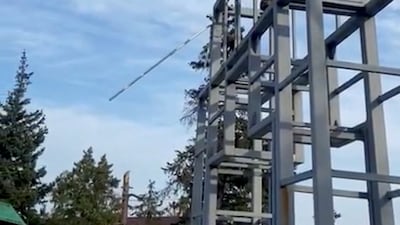Treaties denounced as illegal by the West to annex four occupied regions of Ukraine have been recognised as lawful by Russia's Constitutional Court.
Documents published online on Sunday said the court ruled to “recognise … as corresponding to the constitution of the Russian Federation” accords for Ukraine's Donetsk, Kherson, Lugansk and Zaporizhzhia to become part of Russia.
The four regions represent territory equal to about 18 per cent of Ukraine's total land area.
Ukraine and its western allies said the annexation, which followed referendums declared a sham by the West, was illegal.
The news comes a day after Ukrainian forces retook the city of Lyman, located in Donetsk.
In a brief video posted on Sunday on Telegram, President Volodymyr Zelenskyy said the city had now been “fully liberated” by Ukrainian troops.
“As of 12:30 (9.30am UK-time), Lyman is fully cleared,” he said in a short video clip on his Telegram channel.
There was no comment from the Russian armed forces on Sunday on the status of Lyman.
The Russian Defence Ministry said on Saturday it was pulling troops out of the area “in connection with the creation of a threat of encirclement”.
Mr Zelenskyy has vowed to press ahead with efforts to recapture land in the east.
“During this week, there were more Ukrainian flags in Donbas. It will be even more in a week,” he said in his nightly address.
Russian officials “have already started biting each other” in a bid to assign blame for military setbacks, he said.
UK military intelligence said Lyman was likely to have been defended by “undermanned elements of Russia’s western and central military districts” as well as contingents of reservists.
“The force probably experienced heavy casualties as it withdrew along the only road out of the town still in Russian hands,” said the British Ministry of Defence in its daily intelligence bulletin.
“The withdrawal has led to a further wave of public criticism of Russia’s military leadership by senior officials.
“Further losses of territory in illegally occupied territories will almost certainly lead to an intensification of this criticism and increase the pressure on senior commanders.”
Ramzan Kadyrov, the leader of Russia's southern Chechnya region, on Saturday called for a change of strategy from Moscow, “right up to the declaration of martial law in the border areas and the use of low-yield nuclear weapons.”
Other senior officials, including former president Dmitry Medvedev, have also suggested Russia may need to resort to nuclear weapons, but Mr Kadyrov's call was the most urgent and explicit.
Washington has said it would respond decisively to any use of nuclear weapons, with suggestions the US could destroy Russia’s Black Sea fleet.
Pope Francis on Sunday called on Russian President Vladimir Putin to stop the war.
“I deeply deplore the grave situation that has arisen in recent days, with further actions contrary to the principles of international law. It increases the risk of nuclear escalation, giving rise to fears of uncontrollable and catastrophic consequences worldwide,” he said during the Sunday Angelus prayer.
He implored Mr Putin “to stop this spiral of violence and death” and on Mr Zelenskyy “to be open to serious proposals for peace”.
Kyiv has said it would not hold peace talks with Moscow while Mr Putin was president.
The Pope urged the international community “to do everything possible to bring an end to the war, without allowing themselves to be drawn into dangerous escalations”, and to support any efforts to resolve the conflict through dialogue.
It is the first time that the Argentine Pope has directly addressed the Russian leader in a speech since the start of Moscow's invasion on February 24.
Pope Francis has been trying since the start of the invasion to open a path of dialogue with Moscow, while condemning a “cruel and senseless war”.


